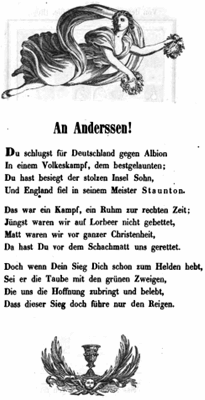'On Anderssen'
My recent post Down the Rabbit Hole mentioned,
I discovered the magazine Schachzeitung, 'von der Berliner Schachgesellschaft', Volume 1, 1846 (starts in July).
Since then I've been searching the Google Books digital collection of 19th century chess literature, looking for the most relevant files. Schachzeitung is just one example of many periodicals available.
 So far I've collected 23 of the first 26 annual editions of Schachzeitung (1846-1871). My main objective is to locate information about the early, unofficial World Championships, where the German master Adolf Anderssen played a central role for many years.
So far I've collected 23 of the first 26 annual editions of Schachzeitung (1846-1871). My main objective is to locate information about the early, unofficial World Championships, where the German master Adolf Anderssen played a central role for many years.
Starting in 1851 Anderssen was listed on the annual cover page as one of the two editors of Schachzeitung. In fact, his name always appeared first. This lasted for nine years, but the Di Felice extract that I quoted in the 'Rabbit Hole' post doesn't even mention him.
Anderssen was also the winner of the 1851 London Tournament (London, V-VII, 1851). The 1851 edition of Schachzeitung (vol.6) has many stories on the event, but it will be some time before I'm able to understand them correctly.
One of the features of 19th century chess magazines that you don't see much in the 21st century is the importance of poems -- sometimes long poems, stretching for many pages. Shown above is a short poem from the last page of the August 1851 issue, titled 'An Anderssen'. That would have been a month or so after the 1851 London tournament ended. When I fed the OCR output, line by line, into Google Translate, it gave me the following translation.
You beat Albion for Germany
In a people's struggle, the best-humored;
You have defeated the proud island son,
And England fell in his master Staunton.
That was a fight, a glory at the right time;
Recently we were not bedded on laurel,
We were Matt before Christendom,
Since you have saved us from the checkmate.
But if your victory raises you to the hero,
Be he the dove with the green branches,
Who brings us hope and animates,
That this victory would only lead to the round
That's not too bad; the software choked only on the word 'Matt'. How would it do on a longer poem? I'll never find out unless I find a poem so compelling that I just have to know what it says. As for AI/NN translation of poetry in general, that would be a different area of research. I doubt there is much overlap with chess literature.




No comments:
Post a Comment